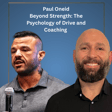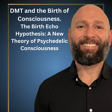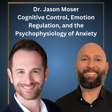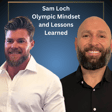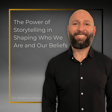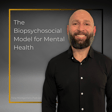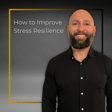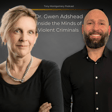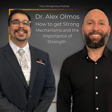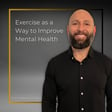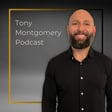Become a Creator today!Start creating today - Share your story with the world!
Start for free
00:00:00
00:00:01

Changing Our Beliefs to Improve Our Physical and Mental Health
In this episode I explore the idea of how our beliefs can impact our physiology, biology, and psychology. How the research shows the power of changing our beliefs can have on our mind and body. Tangible tools to improve our mind and body. Lastly how storytelling can impact our creativity, education, and motivation to exercise.
Transcript
The Power of Personal Narratives
00:00:01
Tony Montgomery
this episode, we're gonna talk about um building on upon the last episode, how storytelling and our beliefs and um our perceptions can begin to not only um shift the way we see the world, but also the way we see ourselves and how that can have a biological, um psychological and physiological impact on us as as human beings. um So the stories that begin to shape our beliefs about the outside world can really profoundly shape how we understand ourselves. And in psychology, um there's a field called narrative psychology, and it's recognized that ah we are stories and we tell about ourselves. So we are the stories that we we tell about ourselves. And this sense of identity, um who we are, what our life means is constructed as a personal narrative, a life story that we continuously update and refine
00:01:00
Tony Montgomery
um And these, these stories do not simply reflect like our personality, they are our personality, or at least they become important parts of it.
00:01:11
Tony Montgomery
And these, these things can begin to construct these, these labels about how we we see ourselves and um labels can be valuable in the sense that they can give us this idea of um something that we that we have and that we can progress towards fixing or progress towards um having a better full understanding of it.
00:01:34
Tony Montgomery
And they can also cause detriment as well by um making them seem that it is it is rigid, that they are essentially who we are, as opposed to a part of who we are.
00:01:47
Tony Montgomery
um so we have to be careful with this idea of labels and constructs versus um Tendencies that we that we may have and and what the power is behind those things and how we can um utilize that.
00:02:03
Tony Montgomery
And we have this. i mean Each of us have this internalized autobiography that gives our life coherence and and purpose. And this self narrative can greatly affect our our mental health.
00:02:15
Tony Montgomery
So an example to consider would be two people both face significant hardships. One person's life narrative might be that um I've overcome these challenges and and grown stronger, and my life is a story of redemption and resilience.
00:02:33
Tony Montgomery
And another might be that I am cursed with with bad luck. and every time things start to go well, something goes wrong. and within those two narratives, you can see one um has this idea of a growth mindset and this idea of if agency, and the other one has this rigid, um fixed mindset, and it begins to to lose agency as the the world happens to us as opposed to us happening inside the world with or with our own control. And the more that I look into the research, the more that I
00:03:05
Tony Montgomery
explore this idea of agency, and whether or not we have it, and what are the boundaries that take that away from us, I think that plays a pivotal role in our ability to have um positive mental health experiences.
Narrative Mindsets and Mental Health
00:03:19
Tony Montgomery
And the You know, the the narrative based off of similar objective events can lead to very different out outcomes. Right. One has a hopeful one. One has a hopeless one in emotional states. And um one of the things that I think that gets propagated now is this And it's been propagated for a while. and And, you know, things that get propagated, there are truth to them, but you don't want that truth to be a defining factor of whether or not you have agency in the world. And this idea of um oppressed versus oppressor and the idea that the oppressed um no longer has the ability to overcome their situations due to the oppressor having all the power in the world. And obviously there's there's truth to that in the fact that the oppressors do have a lot of power. But I think that narrative tends to bind us to this lack of agency that we are stuck in this due to circumstances outside of our control and that
00:04:25
Tony Montgomery
Whether or not that that's something that is endowed upon them um for reasons of power control, or whether or not that is just a narrative that they've built based off of of truth and probably somewhere in the middle um that they're they have this inability now to to have power for them for themselves.
00:04:48
Tony Montgomery
And I think that the the resource supports this idea um that the the content and the structure of one's life narrative correlates with with well being people whose life stories feature redemption sequences, um bad experiences that ultimately lead to good outcomes or personal growth tend to have higher life satisfaction and positive mental health, whereas those whose story features um contamination sequences, good times that were spoiled or followed by bad outcomes, tend to have worse mental health.
00:05:18
Tony Montgomery
And there was a study done on midlife adults who saw that their lives as um following a redemptive narrative scored higher on measures of um generativity, which is concern for others in society, and had greater psychological well-being, whereas the ones who saw their lives as a series of failures or betrayals can be associated with depression and anxiety.
00:05:42
Tony Montgomery
And psychologists also examine coherence and personality narratives. and A healthy narrative has a certain coherence. Events are arranged in an understandable order. Cause and effects make sense.
00:05:56
Tony Montgomery
And there's some integration of painful experiences. Trauma can shatter that coherence. People with PTSD often describe their traumatic memory as fragmentary, chaotic, or like it doesn't feel real to them.
00:06:10
Tony Montgomery
It lacks ah a structure, a narrative structure. And part of healing is to reintegrate um the trauma into a coherent story of the self. And we'll talk about some of the ways that that they do that through storytelling through um ah psychodynamic pharmacological interventions, and um You know part of part of this ah research done by James pen Penbaker and others are on expressive writing and found that when people write about traumatic or emotional experiences, those who eventually construct a more organized narrative of the event tend to experience greater improvements in in mental health.
00:06:51
Tony Montgomery
um One of the studies, I'm not going to be able to recall it verbatim, but when there was a study about journaling. think it was like 45-minute intensive journal. And um the subjects came in that had traumatic experiences.
00:07:05
Tony Montgomery
And they wrote for 45 minutes on that traumatic experience. And then they came in the next day, I believe. um And they did the same exact journaling. And they found that through this, i believe it was a five-day process of 45-minute journaling that they were able to um Dr. Jason Lepojarvić, M.D.: the trauma into a coherent story of the of the self and through this intensive process of these five days of long journaling they were able to have reduced symptoms of of ptsd and.
00:07:39
Tony Montgomery
We know that that is the construct the construct of what helps people get through traumatic experiences.
Trauma and Healing Narratives
00:07:46
Tony Montgomery
MDMA serves ah a very similar purpose from a psychedelic um pharmaceutical standpoint of of healing and growth. And we'll we'll talk about that ah a little bit more um in a second.
00:07:59
Tony Montgomery
So what they found is that they the hallmark of recovery can be when a survivor can say this terrible thing happened to me, but here is how I've made sense of it and how it fits into my life story moving forward.
00:08:11
Tony Montgomery
And the mere act of forming a narrative is therapeutic. Studies show that translating chaotic experience into a structured story is linked to reduced stress and better mental and even physical health.
00:08:25
Tony Montgomery
And when people first write about their trauma, their accounts might be disjointed. But over days of writing, ah they naturally start using more cause and effect words and organizing the timeline, indicating a form and narrative.
00:08:38
Tony Montgomery
And those are the individuals who show the biggest health improvements. On the other hand, there's this idea of getting stuck in a certain narrative and that can maintain those mental illnesses.
00:08:49
Tony Montgomery
um So in depression, individuals often have a narrative of loss, ah pessimism or self-blame. um Some of the words that they would use to describe would be I've always been a failure and nothing will ever work out.
00:09:03
Tony Montgomery
And this story can become a mental script that plays repeatedly filtering all new experiences through ah negative lens. And then cognitive behavioral therapy in one sense tries to interrupt and and rewrite these internal monologues to replace a maladaptive story and replacing that idea of, you know, I'm i'm worthless because of X, Y, and Z with a more balanced idea of, you know,
00:09:33
Tony Montgomery
X happened, but that doesn't mean I'm worthless. I have succeeded before and I will find a ah new path. And this is something that talk to my students about a lot is this idea as exams come up, look at look at past experiences to define how you're going to do in future experiences. right So if if you've taken exams um previously this semester and you've gotten A's on them, that narrative tells you that there should be no reason to think that if you do the same exact steps, you're not going to get an A again.
00:10:02
Tony Montgomery
And just being able to shift that balance of perspective begins to allow them to dampen the anxiety around it. And they're able to retain information better due to stress and anxiety not being a big driving and factor in their life, because we do know that stress um can hinder our ability to um form memories and and consolidate things and and have these heightened cognitive experiences.
00:10:29
Tony Montgomery
And this idea of narrative therapy takes the um patient as a storyteller who can reauthor their own life. And it's a form of psychotherapy that was developed in the 1980s by Michael White and David Epstein.
00:10:45
Tony Montgomery
And um it's built around the idea of separating a person from their problems and helping them craft, empower a new narratives. Within this therapy, The therapist might ask the client to tell their story, how they see their life, their problems, their relationships, and then work with them to deconstruct unhelpful plots and highlight um unique outcomes.
00:11:09
Tony Montgomery
Times when reality didn't fit the problem of the of the story. key Some key techniques within this is to include externalization. So an example of that would be um instead of saying, i am an anxious person, saying, i am someone who struggles with anxiety. Again, you're taking that that label of I am an anxious person that has agency over you now, and then you're giving yourself back agency as describing yourself as a person who has a tendency towards anxiety sometimes.
00:11:43
Tony Montgomery
and this allows you to have agency over the situation. So again, these narratives are all about providing agency to the the person. And this can help people gain distance and realize they are inherently broken um or defined by the problem.
00:12:01
Tony Montgomery
And they can change their relationship to it. Another technique within this narrative therapy is finding alternative storylines. So the therapist and the client search for neglected pieces of the client's experience that don't fit the dominant negative narrative.
00:12:18
Tony Montgomery
and build those into a new story. So an example of that would be um ah person who sees their life as a string of failures, um might with gentle question, like recall instances of um perseverance, kindness, or skill that they had dismissed, highlighting these and threading them together offers a counter narrative.
00:12:41
Tony Montgomery
And that can be something that can be extremely helpful. showcasing that this person is not um x, but in fact, they are resilient, they are caring.
00:12:53
Tony Montgomery
um And they've just gone through some tough, tough circumstances. But in the past, that character has been resilient and can push through. And the ultimate goal is for the client to see themselves as the author of their own story, um who can choose interpretations that align with their values and hopes, rather than feeling trapped in a story that had internalized in them.
00:13:17
Tony Montgomery
And there's more growing evidence that narrative approaches can be effective for various mental health issues. Meta-analyses have found that narrative therapy can significantly reduce depressive symptoms in some populations.
00:13:30
Tony Montgomery
It has also been used with success in treating anxiety, addiction, and trauma.
Therapeutic Storytelling Methods
00:13:36
Tony Montgomery
Narrative exposure therapy is specific um is a specific method used for treating PTSD, particularly in refugees or survivors of complex trauma.
00:13:48
Tony Montgomery
um It involves guiding the person to construct a detailed chronological narrative of their entire life, weaving in the traumatic events with support to process them.
00:13:59
Tony Montgomery
The aim is to integrate trauma memories into a broader life story, contextualizing the horrors within a story of survival and often resilience. And the the APA, the American Psychological Association, um notes that the narrative exposure therapy helps establish a coherent narrative that contextualizes traumatic experiences, which can reduce symptoms of PTSD by ordering and making meaning of of what happened. and
00:14:32
Tony Montgomery
um The research has shown that individuals who manage to turn these fragmented painful memories into a structured story um experience if you um experience fewer post-traumatic symptoms.
00:14:45
Tony Montgomery
And this storytelling in a safe therapeutic setting allows survivors to reclaim agency. And I think the key here is that that safe set in. We always hear about um set in is a set and set and is ah is a very important topic when it comes to therapy. We have to create the safety that people can explore. Psychedelic drugs allow these people to explore that.
00:15:10
Tony Montgomery
um that safety right because it creates that safety by disrupting brain patterns that allows them to um visit these stories and by having a therapist there guiding them you can also get the same benefit And it gives them their story back, right? And I think that's one of the powerful things about writing, journaling, some type of expression of your internal self.
00:15:38
Tony Montgomery
And that way you can understand the dynamics of storytelling and and how powerful that can be. And then there's this, you know, trying to think about the like the social aspect and, and sharing your story with supportive um friends and, and groups and maybe through poetry or or art.
00:15:56
Tony Montgomery
um And I think part of that is because of um you get some validation through that, right, you have others here and acknowledge your story.
00:16:07
Tony Montgomery
And that can restore a sense of connection. And you're most likely going to hear from other people as you share the story that you know, I've gone through something similar, or I've had somebody gone through something similar, and it makes you feel less like you're alone, and more like this is something that people have gone through, and the people have worked through, and it can bring this sense of um relief and hope.
00:16:31
Tony Montgomery
And and coherence and and closure, right? And it's, um it's part of several groups that allow that have been successful, such as Alcoholics Anonymous, um where members tell their life story through the lens of addiction and recovery.
00:16:48
Tony Montgomery
And they can reframe these past sufferings as part of a journey that led them to growth to help and others, um which imbues those events with new meaning and and it can reduce shame.
00:17:00
Tony Montgomery
And then on the on the flip side, there's certain mental illnesses that can be seen in terms of narrative dysfunction. So for example, people with schizophrenia sometimes have disorganized speech and and thought.
00:17:12
Tony Montgomery
One could interrupt that or one could interpret that as a inability to keep a coherent narrative thread, possibly due to some biological disruptions going on.
00:17:23
Tony Montgomery
um but they may also create elaborate delusional stories, um false beliefs, but they often have an internal narrative logic um treating Treating these delusions can involve gently challenging the story and finding these alternative explanations that the person can accept, um effectively trying to replace a maladaptive story with a more reality-based one.
00:17:50
Tony Montgomery
And in in non-clinical situations, um when someone does get stuck, you can... You know, you can help them through that by helping people revise their narratives and maybe seeing that event from the from a different person's perspective or a point of view that is um seen as a as a learning experience and can um this can unlock forgiveness and and emotional relief.
00:18:18
Tony Montgomery
um And then another another aspect is how shared narratives can affect collective mental health. So in communities that have experienced trauma, like war or natural disaster, collective storytelling in the form of oral histories or communal rituals can facilitate group healing.
00:18:36
Tony Montgomery
um Dr. ethan Ethan Cross talked about this in his new book um called Shift, where he his grandma was a survivor of the Holocaust.
00:18:48
Tony Montgomery
And um she never talked about it, except for one time a year when she got together with other survivors, and they were able to talk and express everything. And it was very cathartic. And it was very relieving because of that shared experience. And we see that with um through my research of of interviewing veterans that a lot of veterans seem to have a hard time connecting with therapists because that therapist does not have that shared experience of, of war of military trauma, um and that they only feel secure talking to either other veterans, um or other therapists that have gone through similar experiences.
00:19:31
Tony Montgomery
And this idea of being able to share your story um with people that can understand it from from the same perspective allows you to create a create that safety mechanism that we were talking about, that you're not going to be judged, they're going to understand And I think that's one of the most important things that we can think of in terms of when we do listen to people to to not judge their story and to not interject your feelings, but more so to listen and to understand and to have empathy and
00:20:03
Tony Montgomery
um I think one of the one of the new tools that they're coming out with um to help with these experiences, to rewrite the story that's been um very powerful and has shown very positive effects is um psychedelic therapy, in particular MDMA.
00:20:22
Tony Montgomery
And the reason why MDMA is is so successful is because it allows people to process and reshape the emotional narrative of a traumatic event.
00:20:33
Tony Montgomery
um It reduces the fear and hyper vigilance and ah allows the story to be told. um So trauma can lock people into like survival mode and that memory is too threatening to revisit. And what MDMA does is it reduces the activity in the amygdala, um which is where the brain has a tendency to have that fear response.
00:20:56
Tony Montgomery
um And then it increases prefrontal cortex regulation. So it reduces the fear response and then it increases your ability to make decisions and to um revisit painful memories without becoming overwhelmed due to that reduction of the amygdala response.
00:21:14
Tony Montgomery
And what this does through therapy and talking through a therapist while on this drug, it opens a a rare window where the trauma can be narrowrred narrated and and reprocessed.
00:21:25
Tony Montgomery
um you know one of the One of the things that I've heard through therapy is that they were able to talk about sadness without being sad.
00:21:37
Tony Montgomery
And that allowed them to dive deep and go into it as as deep as possible without having those emotions um trigger this fear response that's going to lock them back up.
00:21:51
Tony Montgomery
And it also increases the feelings of of trust and connection and and safety. And it does that by boosting oxytocin, um prolactin, serotonin, and it creates these feelings of of warmth and bond and and and openness.
00:22:07
Tony Montgomery
And it makes people feel connected to their therapist and themselves. And that connection allows them to um explore in you know relational and like secure context rather than from a place of isolation or self-blame.
The Role of Stories in Learning
00:22:22
Tony Montgomery
Self-blame is one of the biggest things that is characterized in a traumatic experience. So this will allow them to um release that blame, release that shame.
00:22:32
Tony Montgomery
And it can and can also begin to shift that emotional tone of the memory. So under MDMA, they can experience a lot of self-compassion and they can reinterpret the event from a new lens instead of identifying as a as a victim, a helpless victim. They might recognize their strength, resilience or innocence in this situation.
00:22:54
Tony Montgomery
And this reframing changes the the core story from um I'm broken to I survived or even I protected myself the best that I could. And it also promotes memory reconsolidation.
00:23:07
Tony Montgomery
um the The neuroscience suggests that when a memory is reactivated in a safe altered emotional state, it can be re-encoded with a new emotional valence. And MDMA enables the trauma to be processed in a context of safety and support, which fundamentally like alters its impact on the psyche going forward.
00:23:31
Tony Montgomery
And storytelling can also help with this idea beyond trauma um and beyond the the mental health aspects. there's There's this idea of, again, providing agency to people and providing them um with this thought process that allows them to be less rigid and and less fixated and and more expansive and more growth oriented and this can play a role in the education system and people can learn through these these stories and um and we've seen that right we've seen that through storytelling it can take um
00:24:13
Tony Montgomery
somewhat dry information and create engaging meaningful content. And it can also um show them to expand their thought and their their creativity, which um research shows that creativity is is something that is declining as as we get more technologically advanced, um that we're seeing less and less breakthroughs in science, less and less patents.
00:24:37
Tony Montgomery
um and i think a a large part of that is because the shift in the education system went from um open-minded thinking to ah this idea of standardized testing as being the rigid and structure of success in academia academian education um and then research in in cognitive science finds that narrative context can increase the student's motivation comprehension and memory for the material And that's something that I talk to my students about all the time is as you're going through these courses, as you're taking a stats class, as you're taking an anatomy a class, as you're taking these classes, try to link them to stories that interest you. Try to link them to athletes that you want to work with or link them to um research that you want to read to have a better fundamental understanding of it.
00:25:23
Tony Montgomery
And these these narrative approaches can improve understanding um who for for people who might find it to be like dull or or abstract and they provide a familiar structure and they make material more concrete and they can ease these students into complex topics and and boost and comprehension and By increasing their motivation and interest to engage with the material, um you're going to see a higher prevalence of spending more time and and effort and lead into deeper learning. And these stories can also enhance meaning making rather than memorizing facts. Students in a narrative context can often understand why those facts matter and how they discovered and and how they apply it in real life.
00:26:13
Tony Montgomery
um history can be one of those topics that can be very very boring and um the material can be very wrote in nature and and it's a lot of memorization anatomy can be the same way but by by telling that story um by telling by teaching these topics through stories um it can create excitement it can create passion and it can create this idea that um we want to learn as opposed to we have to learn.
00:26:41
Tony Montgomery
And it can also engage different types of of learners. Harvard Harvard Business School wrote a piece where storytelling has visual, auditory and kinesthetic components on one.
00:26:55
Tony Montgomery
And visual learners can get mental images from description. And auditory learners can focus on the words and voice. And kinesthetic learners tune into the emotions and can almost feel the story. Therefore, you can encompass this um versatile pedagogical tool, and the stories are emotionally engaging, and they can reduce anxiety around learning. learning And, um and by by having these stories in their in their mind, it's going to improve their their recall when it does come to test taken, because we do know that stories are more sticky in nature, um and it can improve memory retention.
00:27:35
Tony Montgomery
And You know, teachers often observe this idea that um stories can help create, um again, this this memory plasticity, the stickiness to where students um can have a improved learned experience by learning these complex ideas and making them into um these fun and interesting stories so that they they remember them.
00:28:06
Tony Montgomery
And you know there's there's a lot of expansion through teaching, but also through digital technology. And this can allow students to become storytellers themselves. They always say the best way to to learn something and have a full understanding is to explain it to someone else, is to tell that story to to someone else.
00:28:26
Tony Montgomery
um And I think that this, these ideas that these, these stories and these, these pragmatic approaches to create a better understanding, creating more creativity in a student can um improve ah this desire to be a lifelong learner.
00:28:47
Tony Montgomery
Whereas now there's more people now than ever not wanting to go to college um because they're inundated with this idea that um academia is something that is going to be, um you know,
00:29:03
Tony Montgomery
standardized testing, it's going to be learning X to do Y. And it's not nearly as as exciting or as as fun, because they are inundated with these ideas through social media that, you know, college is no longer something that's important, that they can make a life on their own without it. And more people are seeking to be um famous now than they are to be intelligent and and creative.
00:29:28
Tony Montgomery
um And that's where this this caveat comes in that you know, this cognitive load can be a concern. Like if a story is too entertaining but tangential, it might become a seductive detail that distracts from the learning goal.
00:29:46
Tony Montgomery
So educators must align their narrative closely with the instructional content. So when done right, the storytelling is a potent way to make learning stick.
00:29:56
Tony Montgomery
um So it's something that needs to be practiced, something needs to be taught. And that's fundamentally not necessarily where academia has headed, nor is it is it taught to to academics to to be able to express that to the students so that there is this um ability to think outside the box and there was this really good book that i read as an undergrad it was called the pedagogy of oppression and the whole idea was that the education system um due to its nature of standardized tests and a very black and white fundamental thinking that it is a
00:30:39
Tony Montgomery
a way to create this power dynamic of people that won't ask questions, that won't challenge the narrative, won't challenge the norm. um And it was a very compelling book with this idea that if we can create kids who um get in trouble for challenging the norm, get in trouble for pushing back, get in trouble for thinking on their own, um where they have to think in these binary ideas of black and white that we're building these adults that are gonna do the same thing and how that can be something that can be a governmental and political,
00:31:14
Tony Montgomery
um you know, success for them to where they can control people more easily through um their inability to think outside the box, think creatively on their own.
00:31:25
Tony Montgomery
um And we've we've seen this idea where people now are more fundamentally transfer to um reading the headlines, believing what they hear, and not questioning reality, um not questioning things that don't come um and fit their bias. They would rather have more things fit their bias. So they search for those things and they only look for the headlines.
00:31:53
Tony Montgomery
and And once they see the headline, they're just, you know proof of purchase, right? They're just continuing to to buy into that. um So this this idea of ethical storytelling and and how we can improve um information and improve the way we think and and see the world is all through this narrative and in storytelling that happens at such a young age.
00:32:16
Tony Montgomery
um And You know, we can we can see this through the media, through journalism. you know, a well-framed narrative in journalism can bring attention to important issues by humanizing them.
00:32:30
Tony Montgomery
um So news pieces about healthcare policy might begin with like a personal story of a patient who suffered under the current system and immediately given a face to a complex issue and swaying public sentiment. And media researchers have documented how such exemplar stories influence what viewers believe.
00:32:49
Tony Montgomery
is typical or important and often um more so than the actual statistics. So as you start to watch the news, um think about what the what the stats say. Do they talk about the stats or are they just trying to tell a story?
00:33:05
Tony Montgomery
um So it can be very positive, it can get people engaged in the story, and it can bring attention to real problems.
Media Narratives and Public Perception
00:33:12
Tony Montgomery
But it can also skew the perception by focusing on sensational personal angles and an unrepresentative of the the broader truth.
00:33:21
Tony Montgomery
And an example we can think of is this public health campaign, um where they're they're found to be more effective in changing behaviors than purely informational ones.
00:33:35
Tony Montgomery
um So Melanie Green notes that in Hollywood films have influenced teens in habits like smoking um because of identification with onscreen characters who smoke and health promoters now deliberately craft these stories where characters model healthy behavior using contraception, getting vaccinated, hoping viewers adopt the those beliefs vicariously. And then on on a flip side, um there's this propaganda and misleading framing
00:34:06
Tony Montgomery
through this idea of fake news and misinformation or malinformation and um what gets pushed and what gets pulled away. And these are usually the things that we see the most because they're emotionally charged stories and they tend to to go viral.
00:34:22
Tony Montgomery
And again, these are these are the outliers, but yet they're so salient in our in our minds and in our forefront that we think that this is what's going on throughout the entire world and and understanding that persuasion can help inoculate the public.
00:34:39
Tony Montgomery
um can help with recognizing the hallmarks of conspiratorial narratives or might alert someone that a piece of content is not objective news, but a crafted fiction aiming to hook them.
00:34:54
Tony Montgomery
And you know social media tells us the same story where everyone is a potential storyteller um and can begin to change the public consciousness about certain topics.
00:35:05
Tony Montgomery
And there's examples of storytelling as a force for for social change. So you have individual experiences and then amplified and woven into a collection narrative.
00:35:16
Tony Montgomery
And then these altered the beliefs of who's reading them and it enables the rapid spread of of false narratives as well. right rumors um before fact checks could could become available and we've we've seen this all the time um we've seen this with the current president uh showcased in a picture that was photoshopped thinking that it was the actual real thing and when confronted with that opportunity to to tell the truth um
00:35:47
Tony Montgomery
you know, just dug dug in dug in deeper, right. And I think, i think what people are are really after nowadays is the truth. And they have this um perception that we're being deceived all the time through factual stories that have come out that's shown deception. So I think one of the the biggest narratives that we can think of is, you know, how can we be more truthful? How can we get the truth out there instead of trying to push um this divisive narrative of of trying to create bigger stories or trying to push your agenda, right? Think of the community as ah as a whole
00:36:26
Tony Montgomery
So this this idea of storytelling, it goes goes through all aspects of of life, from from mental health to how we see the world, to how we interact with people. um And these beliefs and these perceptions that we have can begin to change our brain, it can begin to change our our body.
00:36:45
Tony Montgomery
And, you know, maybe maybe we can use that as a from a positive aspect as well. um And some of the research on this idea that the shift um perception and belief to create these positive outcomes are just as paramount as as these negative ones. So we really want to focus on some of the positive stuff that we can get out of it. And there's really good research from
Mindset and Physiological Responses
00:37:08
Tony Montgomery
Dr. Aliyah Crum's lab that I just want to quickly highlight where we can think about the changing of perception and belief to be a a positive thing. And she's done three studies that eloquently um talk about this and and give you this idea that um there's a physiological component as well. So one of the studies um she did was mindset matters, exercise and the placebo effect.
00:37:35
Tony Montgomery
And the study design, she did this with ah colleague langer And they did it in 2007. And seven and ah they had 84 female housekeepers across seven hotels.
00:37:46
Tony Montgomery
um One of the groups was a control group, they weren't given any information. And the other group was told their daily cleaning work met the surgeon general's criteria for exercise. So before they were able um The study started, they asked these 84 housekeepers, do you exercise um regularly? And they said no.
00:38:06
Tony Montgomery
um So what they did was they told one that yes, your work actually is exercise and you do meet the surgeon general's criteria. And the the other group, they didn't give any information about that.
00:38:17
Tony Montgomery
And they continued their work as usual. um No exercise was added, no nutrition talk, none of that. And what Dr. Crum hypothesized was that merely believing that one is engaging in in healthy exercise, even if the behavior doesn't change, can lead to measurable physiological improvements.
00:38:38
Tony Montgomery
So after four weeks, they ran some of the numbers. they They did pre and post, and the informed group showed significant decreases in in weight in body fat and waist to hip ratio and in systolic blood pressure where the control group had no significant changes and what they found was that the activity levels never changed they didn't differ between groups um steps calories burn all that stuff right and the idea the interpretation of these results is that the belief
00:39:12
Tony Montgomery
that their work was exercised, changed how their body processed that activity. right So we do know that how we we interact with the world, stress, eustress versus de-stress, can really create um a cascade of of either healthy outcomes or or negative outcomes.
00:39:32
Tony Montgomery
And this idea that this placebo effect can begin to have a physiological impact on our behavior. And these mindsets um shift and can enhance the effectiveness of of health behaviors, even without changing the behavior itself.
00:39:49
Tony Montgomery
So another study she did with colleagues in 2013 was called Rethink and Stress, ah the role of mindsets in determining the stress response. They took 388 employees from a large financial institution.
00:40:05
Tony Montgomery
One group received a stress as enhancing video. Another received a stress as debilitating video and a control received no information. So the most important idea to understand is that the videos told the truth of of each one they told the positives of stress and they told the the negative distress was or which are both true um so there wasn't any um lying there wasn't any misinformation about what what these things can do and the the video was a three minute video and over the course of the week and
00:40:39
Tony Montgomery
They emphasize the benefits of stress, so can it enhance performance, learning, growth, or the harmful effects, burnout, illness, etc. And the participants who saw the stress as enhancing videos reported lower perceived stress, showed improved work performance and job satisfaction.
00:40:57
Tony Montgomery
and had a more adaptive cortisol profiles suggesting a healthier physiological response to to stress. And but this what this kind of hints at is that there's this idea that mindset about stress significantly influences um both our subjective experience and our biological stress responses.
00:41:17
Tony Montgomery
So stress is not inherently bad, but how you interpret it shapes its ah its effects. Like we talked about at the beginning of this podcast is, you know, can we see the silver lining in things? Is there a positive that we can get out of this negative experiences?
00:41:31
Tony Montgomery
um And that can begin to change our our physiology. And then the the last one that we're going to go over from Dr. Crumb's lab in 2011 is called Mind Over Milkshakes, Mindsets, Not Just Nutrients Determine Greelin Response.
00:41:46
Tony Montgomery
um So they had 46 healthy adults. They were all given the same exact milkshake, which was 380 calories. um One group was told that the shake was indulgent. It was 620 calories rich and decadent And then the other group was told that it was sensible as a low calorie, 140 calorie fat free guilt free milkshake. Mind you, they were both 380 calorie milkshake. And thing.
00:42:13
Tony Montgomery
They measured ghrelin levels, which is the hunger hormone that drops after eating when satiety is perceived. And they did blood samples before and after consuming the the shake. And what they found was the group that was told that this milkshake was more indulgent, had a steeper decline and in ghrelin indicating they felt more satisfied and the sensible group showed less hormonal response as if they hadn't had a substantial meal.
00:42:39
Tony Montgomery
um So the mindset about what you're consuming, not just the food itself affects physiological digestion signals, which is why they tell you to and enjoy your food, eat it slowly, try to think about each bite as something that was the best bite that you ever had.
00:42:55
Tony Montgomery
And that can leave you with a sensation of being more satisfied. And that can help with the ghrelin response versus the leptin response. and you know, what this, what this kind of hints at is that the nutrition, there's a psychological component, not just ah a, a metabolical one.
00:43:12
Tony Montgomery
And, um, And this, this showcase that, and I think that these ideas of how powerful this belief system is begins to shape our physiology and our biology is absolutely ah amazing to think about.
00:43:28
Tony Montgomery
And, um, and then how can this help with, uh, exercise in an improving people's sedentary behaviors and. you know One of the things that we've seen over the last um decade or so is how can we improve people's motivation and enjoyment through Adam And then also have the Pokemon go that was really popular where people. You know we're constantly active searching for these things, but the zombie Adam And then you also have the Pokemon go that was really popular where people. Adam You know we're constantly active searching for these things, but the zombie run
00:44:10
Tony Montgomery
yeah it's a routine, it turns a a jog into an interactive story where you are a character in ah in a zombie apocalypse. And as you run the app's audio plays a narrative, you hear the audio operator guiding you.
00:44:23
Tony Montgomery
And, you know, so it gives you this whole felt experience. And what they found was that, um, people that use it it, keeps them more active and not focused on how hard the run is, um but it immerses them in in the story itself.
00:44:38
Tony Montgomery
And we know that this shift in focus um from the discomfort of exercise to the excitement of the story can really begin to um shape people's narrative around exercise is a fun thing and that I'm looking forward to doing it as opposed to exercise this daunting task that i that i have to do.
00:44:58
Tony Montgomery
And we know through self-determination theory research that this idea of um have to do exercise versus get to do exercise and looking forward to do exercise plays a pivotal role in people's ability to actually continue to exercise and continue to pursue um healthy behaviors.
00:45:18
Tony Montgomery
And they found that through these apps that the data with story and character progression keeps users engaged far longer than standard fitness trackers um up to three times longer. And that the users report that running for a mission feels more meaningful, turning what was once this like boring workout into an ah adventure. And this narrative provides this um extrinsic motivation and the beginning that can transform into this intrinsic motivation. And we know that intrinsic motivation is the motivation that comes from the inside that focuses on, um you know, not so much the the end goal of of a trophy of a of a desired weight loss of, but it focuses more on um enjoyment in the process and in in
00:46:12
Tony Montgomery
in the run itself. And these, these stories can allow, and these changes in perception can begin to allow this idea that we can, um, create an emotional connection to fitness, um, that could be far stronger than, than the negative one that you hear often of, um, you know, exercising is hard, exercising is not fun.
00:46:34
Tony Montgomery
I don't want to exercise. I'd rather play sports. Right. So this idea of how can we get people out there to um pursue exercise and pursue ah healthy life needs to be shaped in a perception narrative that creates this idea that um it's enjoyable. It's fun. It's something that we look forward to.
00:46:56
Tony Montgomery
And this idea can be done with, you know,
Storytelling as a Skill and Interdisciplinary Tool
00:47:01
Tony Montgomery
group classes. it can be done with um Spartan races. can be like there's so many things that can create this personal journey and personal growth for people to see exercise as a fun outlook.
00:47:15
Tony Montgomery
And that's something that we're focusing on a lot in my lab to do research on is how can we create this experience to be more enjoyable, to be less perceived discomfort, less ready to perceive exertion, and what behavioral changes can we do to shake that.
00:47:29
Tony Montgomery
and this idea of um embodied storytelling um can help within therapy and, and, and within within the arts, and it can leverage this connection between bodily movement and narrative cognition. So by moving through a story, physically, people can experience um catharsis or breakthroughs that take um that talking alone might not achieve right so it's that mind body connection that we know plays a ah pivotal role in how we um release certain neurotraffic factors that help with plasticity that help with changing the way we wire our brain and that can help change the way we see the world and you know there's and there's another concept called embodied cognition and it is a um
00:48:15
Tony Montgomery
understanding that a story entails mentally stimulating the events with one sensory motor system and there's this deep link between how our bodies and brains evolved and why moving through or imagining physical activity actions in a story can make it more salient.
00:48:35
Tony Montgomery
um So narrative fitness as a broader idea could also speak of cognitive or emotional fitness through narratives, essentially training like one's story muscle, right? For scientists and professionals, um there are workshops on narrative training to become better communicators, treating narrative skill like a ah muscle that improves with exercise.
00:48:54
Tony Montgomery
And you know not everyone is motivated by it competition or pure health statistics. Many are motivated by fun and meaning. And it's our job as practitioners to create this fun, create this meaning. And story can provide that. It can turn a workout into a quest.
00:49:11
Tony Montgomery
um where the sweat and effort have a narrative payoff, right? So the the gamification of of fitness can be something that can be very successful for people to continue their exercise regime. And then how can we incorporate that into day-to-day life? How can we incorporate that into the research?
00:49:30
Tony Montgomery
um You know, it's, it's an impactful thing that can help produce more physically active people um by creating these embodied narratives that engage the whole person and that aligns our brains um for the love of of of story and ah lines which can reduce the psychological barriers to exercise and enhance that consistency.
00:49:55
Tony Montgomery
So again, in in in general, right, this these idea of of how impactful storytelling can be on belief formation and how it can persuade um people more profoundly than this local belief.
00:50:11
Tony Montgomery
this local identity that they have, and it can serve as vehicles for um for good, and it can serve as vehicles for for bad. And how we have this understanding to shape that can improve not only our mental health, can improve our desire and motivation to learn, and can improve our desire motivation to be active.
00:50:32
Tony Montgomery
And we have to take a very interdisciplinary approach um to deepen our insight into storytelling so that we can have in practical arenas, you know, a teacher um teaching a child geometry or motivating a patient to do physical therapy.
00:50:51
Tony Montgomery
By injecting these narratives, it can help yield um really high levels of engagement. And storytelling techniques are are being consciously deployed um which is going to be a positive thing but we need to do research to understand it neuroscience research can explore how the brain connectivity differs when processing narrative versus expository information evolutionary psychologists um examine how primal narratives like hero myths might satisfy psychological needs evolved in our ancestors and artificial intelligence research are teaching machines to understand and generate stories, because narrative intelligence is central to human like thinking and narrative medicine encourages doctors to listen to patient stories, not just symptoms to treat the whole person.
00:51:41
Tony Montgomery
um So in almost every field, there's a growing appreciation ah that human factors, our beliefs, motivations, and behaviors are best engaged through through narrative. And in an information in an era of information overload, what often cuts through the noise is this compelling ability to to tell a story,
00:51:59
Tony Montgomery
um and we benefit from being mindful of of that sway right we we benefit from having this understanding and you know ultimately storytelling is is neither good nor bad i think it's good to have a healthy skepticism of the things that you hear and it's just part of a fundamental human capacity it has the ability to um illuminate truth or obscure it and to unite people or divide them to empower to to exploit And the difference lies in how we use it.
00:52:32
Tony Montgomery
So by studying this more intently through the lens of of evolution, neuroscience, psychology, exercise, we gain um academic knowledge, but also self-awareness. And we come to recognize that much of what we hold as belief or perspective comes from stories we have absorbed or inherited.
00:52:50
Tony Montgomery
And this awareness allows us to choose our narratives more consciously to to seek out stories that enrich our understanding and empathy and to question those that distort reality or constrict our humanity.
00:53:04
Tony Montgomery
So the story of humanity is is largely the story of the stories we have been told. And um you know it started from myths in ah in an ancient cave um to viral videos on our smartphones and that's come a tremendously long way and it can be our constant companion, our teacher, and sometimes our adversary if we if we allow it to.
00:53:29
Tony Montgomery
And we shape our stories um and our stories shape us, right? By understanding the interplay of story and belief, we equip ourselves to better navigate the world of ideas and to author the the next chapters of our collective human story with wisdom and care. So I hope this understanding of storytelling and perceptions and beliefs to shape who we are, to shape our physiology, our biology, our brain,
00:53:58
Tony Montgomery
um can be something that's really impactful for for you guys to pay attention to to to learn from and to use in your in your day-to-day life to help improve the quality of your life to help improve the behaviors in your life and help improve um the empathy towards people in your life so i hope that you gathered that through these episodes and i hope that it makes sense to you and that the the research is something that you've found to be compelling and and want to dive more into because I feel like this idea of storytelling and agency is is one of the most profound things that we can think of in terms of um improving this mental health crisis that we're in.
